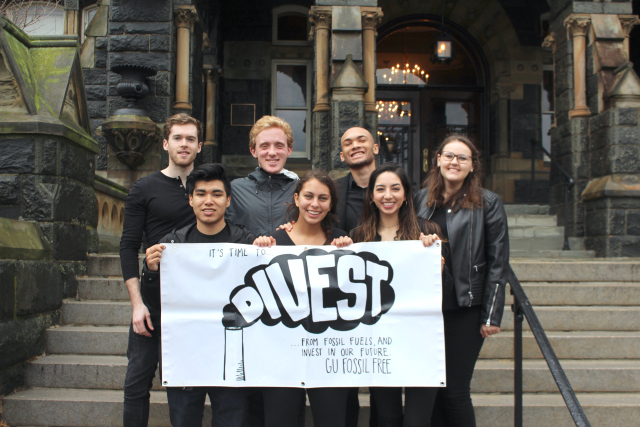GU Fossil Free released a memo detailing its five-year plan for the university to divest from fossil fuel companies March 28 following a meeting with the university’s investment committee last week.
The memo resulted from a meeting between GUFF and the Committee on Investments and Social Responsibility, a group of university representatives charged with amending Georgetown’s investment practices. It provides a detailed plan for how CISR can achieve GUFF’s goal of complete divestment from fossil fuel companies by 2024.
“We have taken a hard look at the specifics of our proposed strategy and methodology as a result of this conversation, and, in addition to answering your questions, would like to elaborate on the potential for divestment from fossil fuels over a five-year timeline with engagement,” the memo reads.

The group’s original proposal, which was submitted to CISR on Jan. 16, recommended that the university divest from all fossil fuel companies by 2024. However, GUFF announced in its memo it now recommends the university only divest from companies that do not meet a set of energy standards that would be outlined by a proposed working group composed of students and CISR representatives.
CISR oversees the implementation of the Socially Responsible Investment Policy, which requires the university to refrain from investing in companies engaged in activities having a deleterious effect on the environment.
By only divesting from companies that do not meet these standards, the university will maintain relationships with companies that are more sustainability friendly and encourage companies that do not meet such standards to change their ways, according to GUFF’s memo.
The memo demonstrates to the university that GUFF has a smart approach to divestment, according to Samantha Panchèvre (SFS ’19), GUFF member and Georgetown University Student Association sustainability chair.
“We were glad to hear some CISR members encourage us to think more creatively about how divestment along a five-year timeline would look like,” Panchèvre wrote in a message to The Hoya.
If Georgetown were to unilaterally divest from companies that fail to meet energy standards, the effects would be symbolic, GUFF wrote in its memo. The importance of the move comes from the potential for other universities to join in divestment to create a much more influential movement, according to the memo.
“If these efforts were to be undersigned by multiple universities, however, it would be possible to carve out a unique space for educational institutions to meaningfully engage with fossil fuels companies,” the memo reads.
The meeting followed a Feb. 4 meeting that was adjourned early to allow the Georgetown University Student Investment Fund and the Graduate Investment Fund, student groups that manage investments for the university’s endowment and the Alumni Association, to prepare presentations on the topic.
The meeting was effective in advancing divestment with CISR, according to GUFF member Celia Buckman (SFS ’21).
“While there were no official agreements or policy developments finalized during the meeting, we welcomed the insight of CISR members regarding the proposal,” Buckman wrote. “This meeting was an example of the productive dialogues that can result from the protocols established by GUFF in conjunction with CISR in 2017.”
GUFF expects CISR to make a decision on the group’s divestment proposal in April, according to Panchèvre.
Georgetown is dedicated to sustainability and intends to continue facilitating discussions on the divestment, according to university spokesperson Matt Hill.
“Georgetown University takes seriously matters related to social responsibility and its investments,” Hill wrote in an email to The Hoya. “CISR plans to meet again this semester to continue its review of GU Fossil Free’s proposal.”
GUSIF and GIF were not available for comment at the time of press.
GUFF, which has long been a strong proponent of the university’s adoption of more socially responsible investment practices, has been successful in its previous petitions to the university.
In 2017, Georgetown’s board of directors enacted a Socially Responsible Investing
Policy aimed at aligning the endowment’s investment practices with the university’s ethical responsibilities. Later that year, the university removed all investments from tar sands after GUFF pushed for the university to divest from all carbon-based energies.
GUFF’s success in these previous petitions laid the foundation for the most recent proposal to completely divest from all fossil fuel companies, according to Buckman.
“We definitely feel that there’s much more groundwork for our proposal this year, given that it’s the first full divestment proposal since the passage of the SRI Policy; divestments from thermal coal, tar sands, and private prisons; and the divestments of peer institutions, such as Seattle University and Middlebury College,” Buckman wrote.
The issue of divestment is an ongoing process that will take input from both students outside GUFF and the university, according to Buckman.
“We’re looking forward to strategizing with the administration and the larger Georgetown community to divest from a place of genuine environmental and social concern and financial prudence,” Buckman wrote.




















